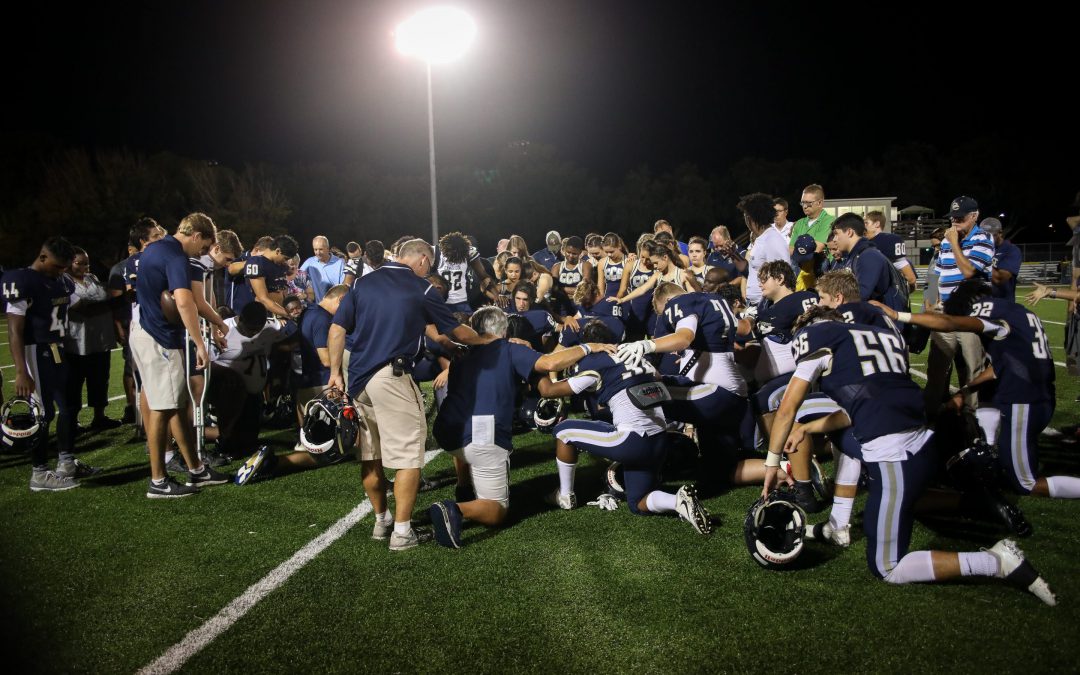Cambridge Christian School is a member of the FHSAA (Florida High School Athletic Association) and strives to promote sportsmanship throughout all our Athletic Programs, whether home or away. Sportsmanship doesn’t begin and end with students. It is necessary to have parents and other adult spectators set the tone for our students by displaying exemplary behavior at all athletic events. Good sportsmanship is a measure of the understanding and commitment to Christ, fair play, ethical behavior and integrity.
Like it or not, high-profile athletes and coaches are looked up to as role models by younger athletes. From television to Twitter, every move, good or bad, is scrutinized and etched into the minds of kids who watch them perform. All too often, headlines glorify the “bad boy” image that includes incessant trash-talking or refusing to shake hands before or after a game. Reactions to these incidents include everything from “who cares, as long as it doesn’t affect me” to total outrage that grown men and women, especially those who make millions of dollars, can act like schoolchildren.
Examples of good sportsmanship do exist, even if they are often drowned out by the negative headlines. A recent example is the outpouring of support Oakland A’s outfielder Stephen Piscotty received after the death of his mother, Gretchen, from Lou Gehrig’s disease. When Piscotty returned to the lineup, just two days after her death, he received a moment of silence and a salute from both dugouts prior to a game with the Houston Astros. Bad sportsmanship isn’t limited to professional and college sports. Parents, coaches and players get just as emotionally swept up in a T-ball or travel league game. This often results in verbal or physical outbursts, like a recent fight between a coach and parent at a youth baseball game in Indiana.
Sports celebrities may shape the way we coach and play, but the real role models should be a child’s parent and coach. Here are five characteristics of good sportsmanship everyone should follow.
- Your behavior defines who you are. Everyone learns how to act by watching others and how they behave, according to author and strategic thinker Gary Ryan Blair. If teammates and opponents see you constantly taunting, criticizing or sulking after a poor play, they’re likely to view you in a negative way. On the other hand, if you hustle on every play, encourage teammates, or listen to and learn from constructive criticism by your coach, you’ll be viewed as a positive example and a person people want to be around.
- It teaches teamwork. Some players believe their individual actions or performance doesn’t affect anyone but them. Not so, says Ryan. If one player is solely concerned about his or her personal stats, or exhibits negative behavior, it reflects on the whole team, whether it’s fair or not. Players who demonstrate good sportsmanship understand the game isn’t all about them, and that their actions reflect the overall attitude of the team.
- Kids learn to win and lose with dignity. Being competitive and wanting to win is fine. But how one handles wins and losses is just as important, according to All Pro Dad, an online community providing tips to dads on raising kids. It’s easy to fall into the temptation of becoming arrogant or showing up the other team after a win. Likewise, losing can bring out negative behavior such as pouting or refusing to shake your opponent’s hand after the game. Coaches can set great examples of being gracious in victory as well as in defeat.
- It emphasizes playing fair. Rules in competition aren’t created to make the game stifling or more difficult; they’re meant to keep things organized, according to Stanford Health. It’s tempting for teams to go around or break the rules to get an edge over their opponent. But coaches and players who show integrity play by the rules and won’t tolerate cheating on any level.
- It provides opportunities for life lessons. Most kids will be out of sports by their teens, if not earlier. Perhaps the most compelling reason they should learn the habits of proper sportsmanship is it will help them in other aspects of life outside sports, says clinical psychologist and sports psychology consultant Richard D. Ginsburg. The same values learned in competition, such as teamwork, showing respect for teammates, coaches, opponents, and officials can be carried over to the classroom, at home, and when they become adults.
Ok, you get it, sportsmanship matters! So how can you practically show sportsmanship while attending a game? Below are some acceptable and unacceptable behaviors regarding sportsmanship and fair play.
Acceptable Behavior:
- Accept all decisions of contest officials.
- Applause during player introductions.
- Students leading fans in positive cheers.
- Handshakes and prayer (at our home events) between participants and coaches at the end of the contest, regardless of the outcome.
- Treat the competition as a game, not a war.
- Everyone showing concern for an injured player, regardless of team.
Unacceptable Behavior
- Disrespectful or derogatory, chants, yells, songs or gestures.
- Booing or heckling an official’s decision.
- Criticizing officials in any way.
- Yells that antagonize opponents.
- Refusing to shake Hands
- Blaming the loss of a game on an official, coach or participant.
- Hand-held signs containing derogatory language.
- Use of profanity.
- Taunting or name calling to distract an opponent
Credits: Mark Butler, AD Cambridge Christian and Stephen Kerr-Gamechanger






